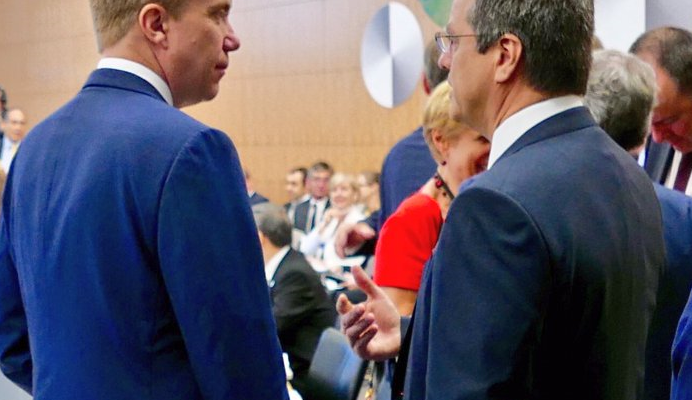The Norwegian Minister of Foreign Affairs Børge Brende underlined that the best way now to demonstrate the importance WTO members attach to the Multilateral Trading System, is by making Buenos Aires as successful as possible and by providing further guidance for work in the WTO beyond MC11.
The complete text of Minister Brende’s statement can be found below:
Chair,
I believe we all realize that 2017 is a challenging year for the WTO and for global trade.
But let me say this: We have been challenged before. Often as a consequence of economic downturn. And we have come out with groundbreaking solutions.
Without taking the comparison too far, I think it is worth remembering the history behind both Gatt and the WTO.
When our predecessors launched the Uruguay Round, they gave us the WTO with a number of important agreements.
Facing great challenges, our predecessors had bold visions, stubborn negotiators and political will.
I know we have at least two of those three here today. Bold visions no doubt. Our Geneva ambassadors pride themselves in being stubborn negotiators. But do we have the political will needed? Even if that means we need to review old positions?
I leave this with a question mark.
Let me take a step back.
In Oslo and Davos, we listed a number of issues for possible agreement in Buenos Aires.
Since then, we see increasing engagement by Members in putting forward proposals and ideas. This is very positive.
On fisheries subsidies I would say there is substantial progress, and good discussions are taking place on services and agriculture.
Nevertheless, there is still a long way to go towards consensus, also on the balance between longstanding -issues of negotiations and other topics such as e-commerce.
(As everybody) I welcome you USTR Lighthizer to this gathering. You have been awaited with eagerness, but frankly also with some concern.
We need the US as an active partner in the WTO.
I look forward to working together with you and other colleagues to maintain and strengthen the Multilateral Trading System to the mutual benefit of all WTO Members.
I look forward to hearing and will listen carefully to your inputs. I hope you will listen with equal attention to ours.
Chair,
Norways core interest remains a strong rules based multilateral trading system, anchored at the WTO, that encompasses all economic sectors - new and old - and responds to the challenges of today.
This system has served us well and continues to be our best avenue forward in our ambition to enhance sustainable development and economic growth.
We believe that the best way now to demonstrate the importance we attach to the Multilateral Trading System, is by making Buenos Aires as successful as possible and by providing further guidance for our work in the WTO beyond MC11.
Norway will continue to actively seek constructive ways forward and participate in finding solutions.
We hope that consensus on fisheries subsidies can be a clear deliverable from Buenos Aires.
The deadline for finding a permanent solution for public stockholding is MC11.
In addition, we need to look for ways to capture incremental progress in various other areas of the negotiations.
Our expectations should, however be realistic. We should all instruct our negotiators not only to intensify efforts, but to look for common ground and new ideas.
Chair,
As ministers, we have an obligation to focus on getting results, not on what´s written where in which mandate. So let us concentrate our efforts on making progress and finding solutions to the benefit of all WTO Members.
With the challenges of Buenos Aires, looming not far ahead, political engagement is crucial. This meeting and the subsequent gathering in Marrakech in October can help each of us to look beyond our own immediate concerns and red lines.
In Marrakech, ministers should take stock by assessing possible deliverables in Buenos Aires, and the need for additional guidance beyond the next Ministerial Conference.
Let's stay engaged and forward looking.
Let's put the WTO at the center when we discuss how we create more inclusive globalization with benefits more widely shared within and among societies.
Let's look for better balance between advanced and emerging markets. Let's improve integration of developing members, and in particular the least developed, in world trade and the Multilateral Trading System.
We are prepared and eager to discuss any proposal to further improve the system, with two caveats:
That we move forward towards further opening markets and more predictable rules, not backwards to protection and uncertainty, and
That the basic principles and integrity of the multilateral system is maintained and protected.
Let's leave Buenos Aires in December hopeful that 2018 will be a good year for the WTO
See the WTO’s official website for additional information on the statement the Director-General made in Paris:
https://www.wto.org/english/news_e/news17_e/dgra_09jun17_e.htm
